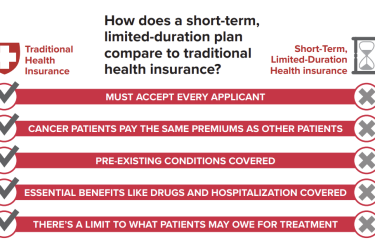
One of the most significant trends in health care over the past few years has been the merger of physician groups with hospitals. By acquiring physician groups, hospitals and health systems can develop accountable care organizations and gain a competitive advantage by requiring employed physicians to refer patients to them.
But last week a federal judge in Idaho ruled that St. Luke’s Health System in Boise had violated antitrust law by acquiring the 40-physician Saltzer Medical Group, in nearby Nampa, Idaho, in December 2012. At the time, Saltzer was the largest independent multispecialty group practice in the state. As result of the antitrust violation, the judge said the hospital had to unwind the acquisition.
Given that the Federal Trade Commission was a plaintiff in the case, the decision raises a question about whether the FTC will pursue antitrust cases in other cases when hospitals acquire physician groups. The decision on Friday by B. Lynn Winmill, chief judge of the U.S. District Court in Idaho, marked the first time a federal court had decided an FTC case against a hospital acquiring a physician practice, as Beth Kutscher explained in Modern Healthcare.
FTC Chairwoman Edith Ramirez hailed the court ruling, calling it an important victory that will spur competition. “The combination of St. Luke’s and Saltzer would have given the merged hospital system the market power to demand higher rates for health care services, ultimately leading to higher costs for both employers and consumers,” she wrote in a statement on the FTC site. “Keeping health care costs low and quality high by ensuring vigorous competition between providers is, and will continue to be, a top commission priority.”
St. Luke’s expects to appeal, reported Audrey Dutton, who has covered the story for The Idaho Statesman. But the bigger issue is that the ruling could lead the FTC to undo other hospital-physician mergers, Dutton added. The FTC joined the case against St. Luke’s last spring after the Saint Alphonsus Medical Center and the TreasureValleyHospital had sued St. Luke’s to stop the merger.
Quoting antitrust attorney Jonathan Lewis of the firm Baker Hostetler in Washington, D.C., Dutton wrote, “The ruling shows that there is legal power in the FTC’s arguments that doctor buyouts can increase a hospital system’s bargaining power with health insurers, leading to higher prices.”
The case was watched closely because hospitals and health systems argue that they need to buy physician practices in order to improve economies of scale and to coordinate care in what has traditionally been a fragmented health care system. But as hospital systems grow larger by acquiring other hospitals and physician groups, the result is higher costs for care, as Robert Weisman reported in The Boston Globe last fall.
In his ruling, Winmill cited the possibility that costs would rise
“The antitrust laws essentially require the court to predict whether the deal under scrutiny will have anticompetitive effects. The court predicts that it will. Although possibly not the intended goal of the acquisition, it appears highly likely that health care costs will rise as the combined entity obtains a dominant market position that will enable it to (1) negotiate higher reimbursement rates from health insurance plans that will be passed on to the consumer, and (2) raise rates for ancillary services (like x-rays) to the higher hospital-billing rates,” Winmill wrote.
A secondary issue stemming from this case is whether hours of witness testimony and hundreds of documents sealed from public view will be released to the public. The parties in the case say the testimony and documents contain trade secrets, as Dutton and the Covering Health blog have reported.
The Statesman, the Idaho-Press Tribune, the Times-News, The Associated Press and the Idaho Press Club have asked the Ninth U.S. Circuit Court of Appeals in San Francisco to unseal pricing information from the case that show how much health insurers pay to hospitals and other providers in Idaho. The press organizations are awaiting a ruling from the appeals court.










